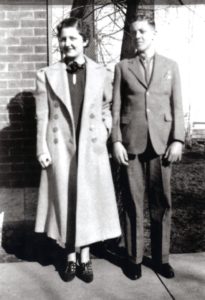
The death of his mother as a complication of his own birth meant that Jack Collins would be raised by relatives, not all of them vitally interested in his welfare. In his infancy, his care was left largely to his father’s much younger sister, Margaret, then a winsome and cheerful 16-year-old; as he grew older, he spent more and more time with his mother’s mother, Ida Finch, and it was to Ida that he fled when his stepmother’s rages became too much to bear.
Jack was 15 months younger than my mother, and she described him sometimes as a “pesky little brother” who stole her roller skates and used the wheels to make a skateboard. Her tone of voice betrayed affection, though; I could see that she had loved him. Generally, she said little of Jack, and we had only a few snapshots to anchor him in our imaginations: Jack at age six, blond and sweet, squinting into the sun as he grasps a croquet mallet; Jack at 14, gazing whimsically at the camera, as if daring the photographer not to laugh; Jack at 17, standing stiffly on a cold Easter morning, his best blue suit not quite fitting as it used to, his hair slicked back in the fashion of the day, his expression no longer so eager nor sweet. The boy who once put on such a good front was by now already grappling with the demons that would eventually destroy him. His attitude seems grim, resigned.
Jack came to his end one autumn day in 1946; the cause, we were told, was an automobile accident. We lived with this myth for years. But my father could not quite keep the family secret; one night he told my brother the true story: Jack had put his head in the oven and turned on the gas. This at least, was the story he was told at the morgue, for he had been the one to identify the body. As my father told it, he drove alone to Chester to carry out this task. My mother could not go; they had two small boys at home, and so she stayed behind.
At the morgue, my uncle’s face told a different story altogether.
“He was black and blue. Like he’d been beaten up,” my father said and his tone carried his meaning. This was no suicide.
“Jack ran with a rough crowd,” was the story my father told my brother. “He might have owed someone some money.”
A mob hit.
When this version of events trickled down to me, third-hand through a sister who’d gotten it from the brother who’d been sworn to keep it all a secret, I mulled this mystery over in my mind, imagining an uncle who’d been the victim of a gangster. Was he tough, cavalier, a chewer of gum and player of craps or poker? Did he swing dance with a flask of gin in his hip pocket? Did he sneak out of the ballroom with a girl of easy virtue?
Had he thrown a few punches himself in a barroom brawl?
Somehow the image did not go with the snapshots in the family album. Blue-eyed Jack squinting into the sun. Jack in his Easter suit. Jack giddy and bashful on the day his father married for a second time.
For whatever reason, though, my father kept this theory from my mother. For the rest of her life she lived with the understanding that her brother had committed suicide. Despite my father’s theories, it turned out to have been likely true; years later I learned that when someone dies, and the body is left alone for a while, a bluish-purple discoloration can occur under the skin because the blood pools in the part of the body closest to the ground. And so what looked like bruises to my father was the natural consequence of Jack lying face down, alone, for some time before he was found.
Jack at the time of his death was 26 years old, married with an infant daughter, discharged honorably from the Army Air Force, a hero—like so many others—of that great, good war. Cocky and brave and surely adjusting roughly to his civilian world, he must have found life difficult on returning home. What became of his little girl or his wife Violet, we never knew. And what drove him to his sad end was something my father could never quite explain. Violet, he told me, “was not a very nice person,” the kind of woman who, my father implied, had been of loose morals and a looser tongue, but that alone was hardly enough to drive a man to such a desperate act.
So what was it? Why did he do it?
That question was impossible to ask at 18, but it was of vital importance to me as I struggled against the yawning maw of a depression so deep it threatened to swallow me whole. What pushed Jack to that fatal answer? I had to know, if I was to avoid the same end.
Yet I could not bring myself to pose the question. Only years later did I come to see a clue hidden in the narrative my father had constructed.
Pop was called to identify the body. He drove to Chester alone to carry out that duty.
He drove alone.
Why him?
Why not Violet? Where was she?
Of course.
She wasn’t there. She’d left Jack.
That is how it came to be that my uncle was alone that final night. The boy whose very birth brought the end to his mother’s life could not endure the loss of the woman he loved. Whether worthy of him or not, she had been his, and now Violet had taken their baby and gone away. And in the dark night, no doubt fueled by alcohol and the gnawing sense of worthlessness that had been his birthright, Jack saw nothing but darkness and despair before him. And so he turned on the gas and knelt down, and there, some hours later, all alone, he died.
And in that death died something in my mother’s heart as well. Unable to talk of him, she left him in the past, mistakenly believing she had buried her grief with him. But she had not. The scar that remained was a barrier to feeling; she retreated behind the untold stories of his life and death, moving more and more deeply into a world where survival depended upon not feeling, but of simply bearing up and moving on.
